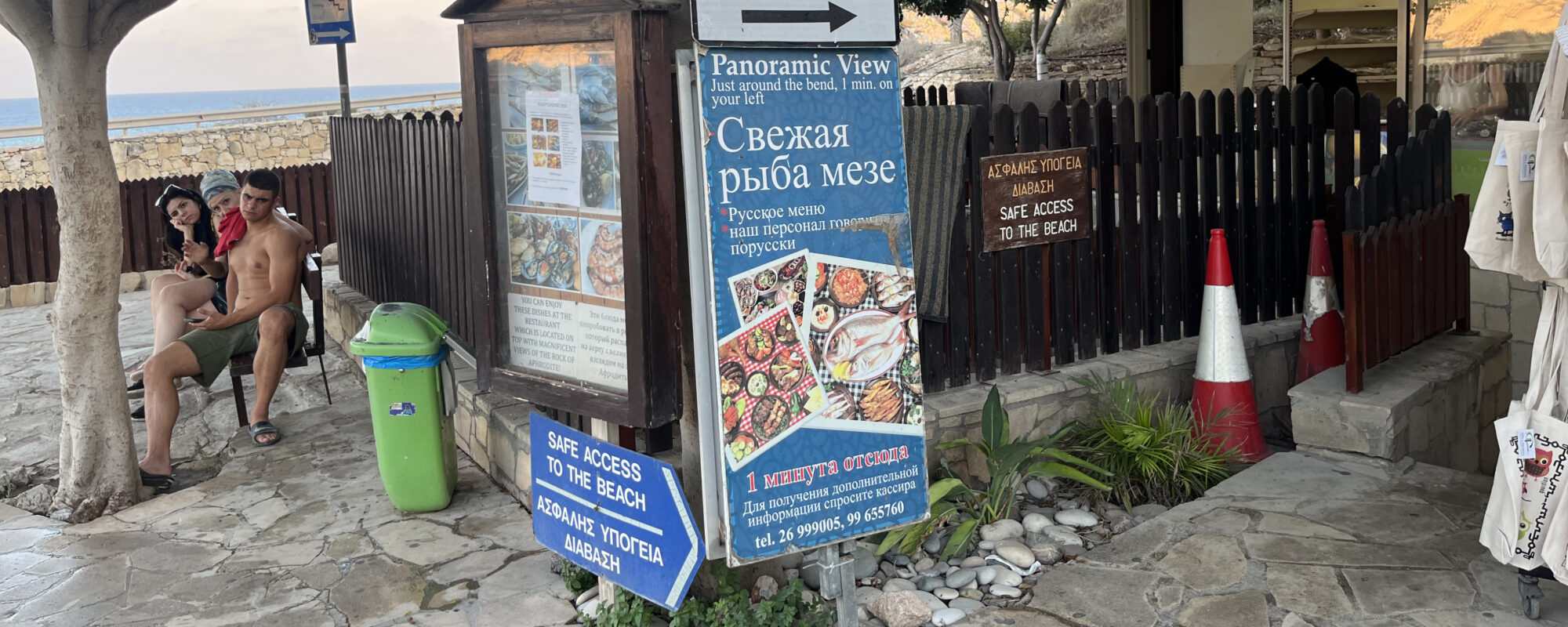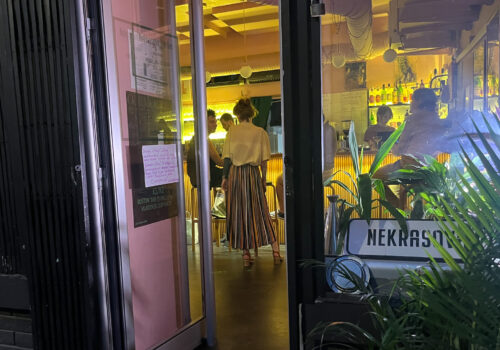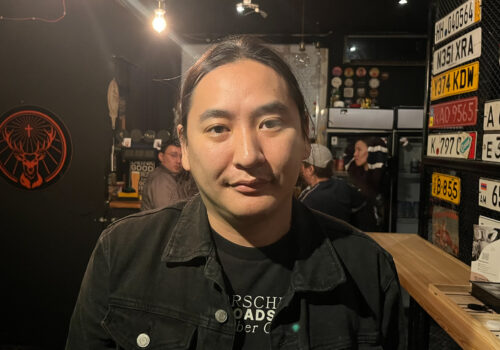LIMASSOL, Cyprus — When you ask Greek Cypriots here about the Russians, they often respond with vague remarks about the economic boost they’ve brought to their side of the island.
“Well, they built those!” a taxi driver remarked, pointing to luxury residential towers stretching toward the Mediterranean Sea shortly after lecturing me about how “a certain Mr. Kissinger” enabled Turkey’s 1974 invasion of the northern part of the still-divided island.
One notable structure on the horizon is the Limassol Del Mar, which, according to a source familiar with its origins who requested anonymity, remains mostly empty. Most of its apartments were bought by millionaires and billionaires from the former Soviet Union for money-laundering purposes and to secure now-discontinued “golden passports.” When that expedited method for acquiring Cypriot—and by extension European Union—citizenship was still available, the price for an apartment of about 2,500 square feet was reportedly 2.5 million euros (about $2.75 million).
The angular, emerald-green facade of the luxury compound rises over coastal Georgiou Avenue, which has been dotted with Russian, Ukrainian and Belarusian-owned businesses—some legitimate, others little more than shell companies—for decades. Just two miles down the road, the Russ-Market grocery store, with its faded blue awnings and concrete, brutalist front, feels like a set from a 1990s crime film about post-Soviet chaos.
Since the 1990s, Limassol—colloquially referred to as “Limassolgrad”—has become a magnet for Russian, Ukrainian and Belarusian entrepreneurs, drawn by Cyprus’s low taxes, minimal regulations—which facilitate money laundering—and fast-track citizenship programs. Following Russia’s annexation of Ukraine’s Crimea region in 2014, many Russian businesses relocated to Cyprus to dodge international sanctions.
The full-scale Russian invasion of Ukraine in 2022 brought another influx, with an estimated 50,000 Russians and Ukrainians seeking refuge on the island. Some of the Russians I spoke with—tech professionals and businesspeople—sought to distance themselves from the Kremlin’s war. Others likely fled Russia because of a pragmatic concern that its growing isolation would limit their career prospects and restrict travel to Europe.
Today, Cyprus’s Russophone community operates almost like a mini–Silicon Valley. However, much of its economic activity exists in the so-called gray market, encompassing pornography, online gambling and questionable applications for artificial intelligence. On the brighter side, there are also more benevolent sectors, like video game development and animation. During my two-week stay on the scorching Greek side of the island, I shook hands with my first billionaire angel investor, met former CEOs of major Russian firms and spoke with a scholar who has reinvented himself as a life coach.
Although the golden passport program was discontinued in 2020 and the EU is ramping up efforts to regulate Cyprus’s economy, fast-track residency permits and the ability to move money through illicit cryptocurrency channels still make Cyprus an attractive destination for wealthy Russians seeking to distance themselves from Russian President Vladimir Putin’s war.
A shady foundation
Sitting in a dimly lit hotel lobby, a Georgian-Israeli businessman nonchalantly boasted to my source, a Russian cryptocurrency entrepreneur I’ll call Misha, about his connections.
“Tell me who you need, brother—local secret services, private security, even the president—I got you,” the Georgian told Misha in raspy, accented Russian, sipping espresso at 10 p.m. and taking a drag on his cigarette. His words reflected the pervasive corruption that is also part of Cyprus’s attraction for many businesspeople from Russia and other parts of the former Soviet Union.
For decades, Cyprus has operated as a haven for illicit financial activities, with elected officials using secrecy laws to mask a system that greatly benefited Russian elites. By 2020, Russians had poured over $200 billion into Cyprus—more than any other European country, including Germany, the United Kingdom and Switzerland combined. On paper, this small island nation of 1.3 million people was one of the world’s largest investors back into Russia, with roughly 300 Russian-owned companies dominating Cyprus’s economy.
Central to the system was the infamous golden passport program, launched in 2007 and expanded in 2013. It granted residency and, eventually, EU citizenship to wealthy people in exchange for substantial investments, often in real estate. Rich Russians flocked to luxury developments like the Del Mar complex, buying overpriced properties not for the homes themselves but to secure passports and launder money. By the time the scheme was exposed in 2020 by undercover Al Jazeera reporters, it had funneled $7 billion into Cyprus’s economy and enabled nearly 3,000 Russians to acquire EU citizenship. It was discontinued in 2020.
Despite the golden passport program’s end, the 2022 Russian invasion of Ukraine reignited international scrutiny of Cyprus’s role as a hub for Russian money laundering. Under pressure from the EU and the United States, Cyprus began cracking down on shell companies and ordered banks to close more than 50,000 accounts. While the island has made strides in reforming its financial practices, critics argue that significant shortcomings remain, leaving Cyprus’s legacy as a financial haven largely intact.
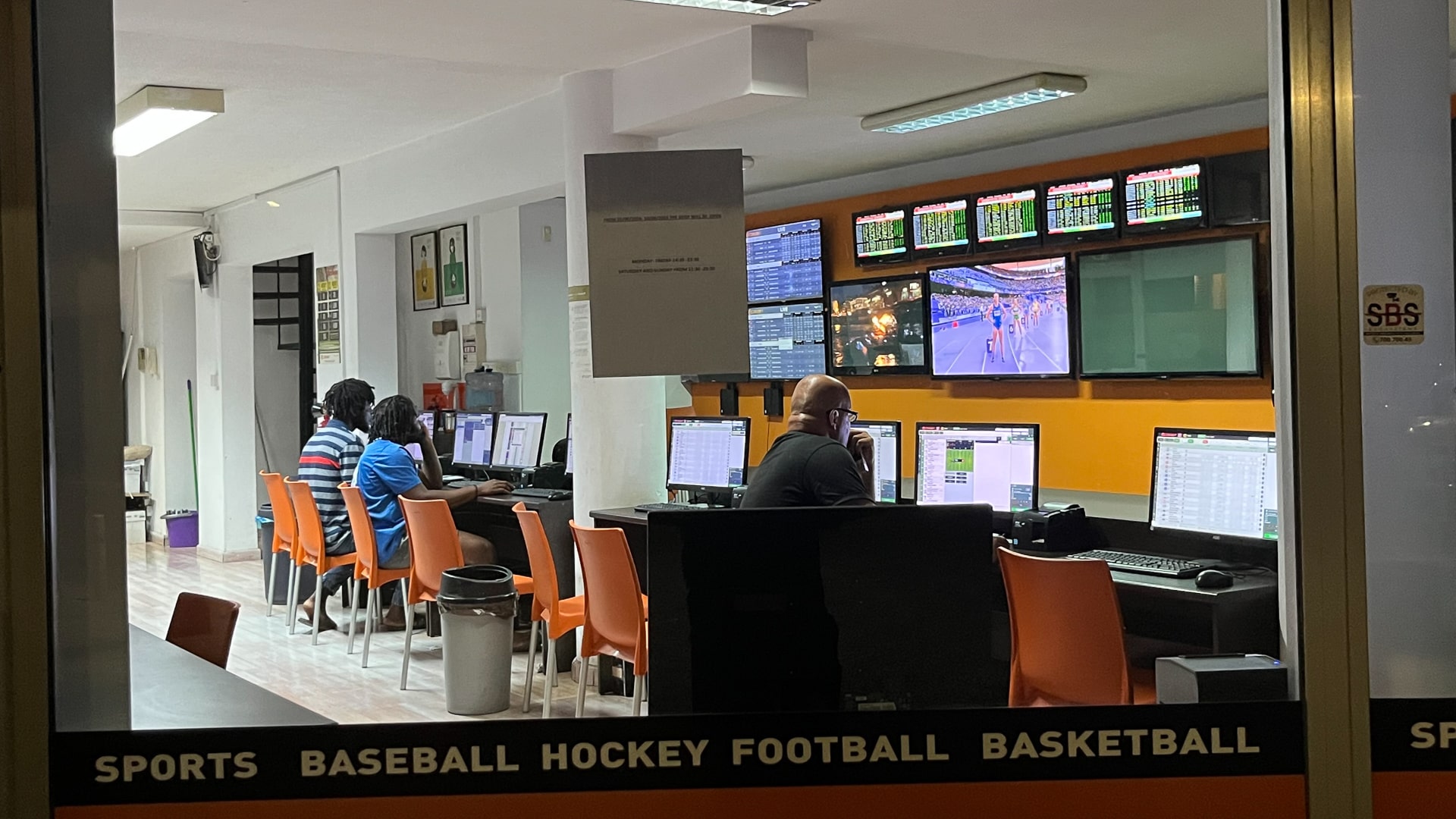
Cryptocurrency and sanctions workarounds
Despite the reforms, Russians continue to arrive in Cyprus. At a networking meetup on the terrace of a seaside restaurant in Limassol, Oleg Reshetnikov, founder of the CypRus IT community and a key figure in the local tech diaspora, outlined the different waves of Russian emigration.
“In the 1990s and early 2000s, Cyprus was where Russian oil magnates laundered their money for reinvestment in Russia,” he said, his long beard tied at the end with blue and yellow ribbons to indicate support for Ukraine. In the 2010s, he added, Cyprus became a hub for Russian and Belarusian companies relocating employees, transforming it into a Russophone tech center.
“Russia’s 2014 annexation of Crimea spurred the first wave, followed by Belarusian companies in 2020 after the [failed] anti-Lukashenko protests,” Reshetnikov said, referring to mass pro-democracy protests in Belarus after a disputed election gave strongman leader Alexander Lukashenko a sixth term as president. “The invasion of Ukraine brought several thousand more, mostly tech workers employed by companies already embedded in the international market.”
By his estimates, 50,000 Russians and Ukrainians have moved to Cyprus since February 2022. Around me, Russians, Ukrainians and Belarusians in flip-flops and button-down shirts networked and brainstormed as the sun set over the glistening sea. Some of the Russians had fully cut ties with their homeland, while others still had one foot in each country. A recruiter who said she was still living in St. Petersburg even approached me.
For affluent Russians with assets or revenue streams in Russia, sanctions have closed off traditional banking channels, forcing them to seek financial workarounds. One person capitalizing on this demand is Misha, a middle-aged businessman who relocated to Cyprus with his wife and children because of the invasion of Ukraine. Raised in an intelligentsia family where values were progressive but money scarce, he launched a career focused on accumulating wealth, even if through questionable means.
Relying on cryptocurrency, Misha became one of many middlemen in Cyprus, helping Russian entrepreneurs and companies move their money into Cypriot banks. On my last evening on the island, he explained how it works over dinner on the outdoor patio of a Tex-Mex restaurant, which, he mentioned, was owned by a Russian businessman as a money-laundering front. A Cypriot waiter wearing a cowboy hat and a beaming smile urged me to try an “authentic American Budweiser.” A Confederate flag hung behind the bar counter.
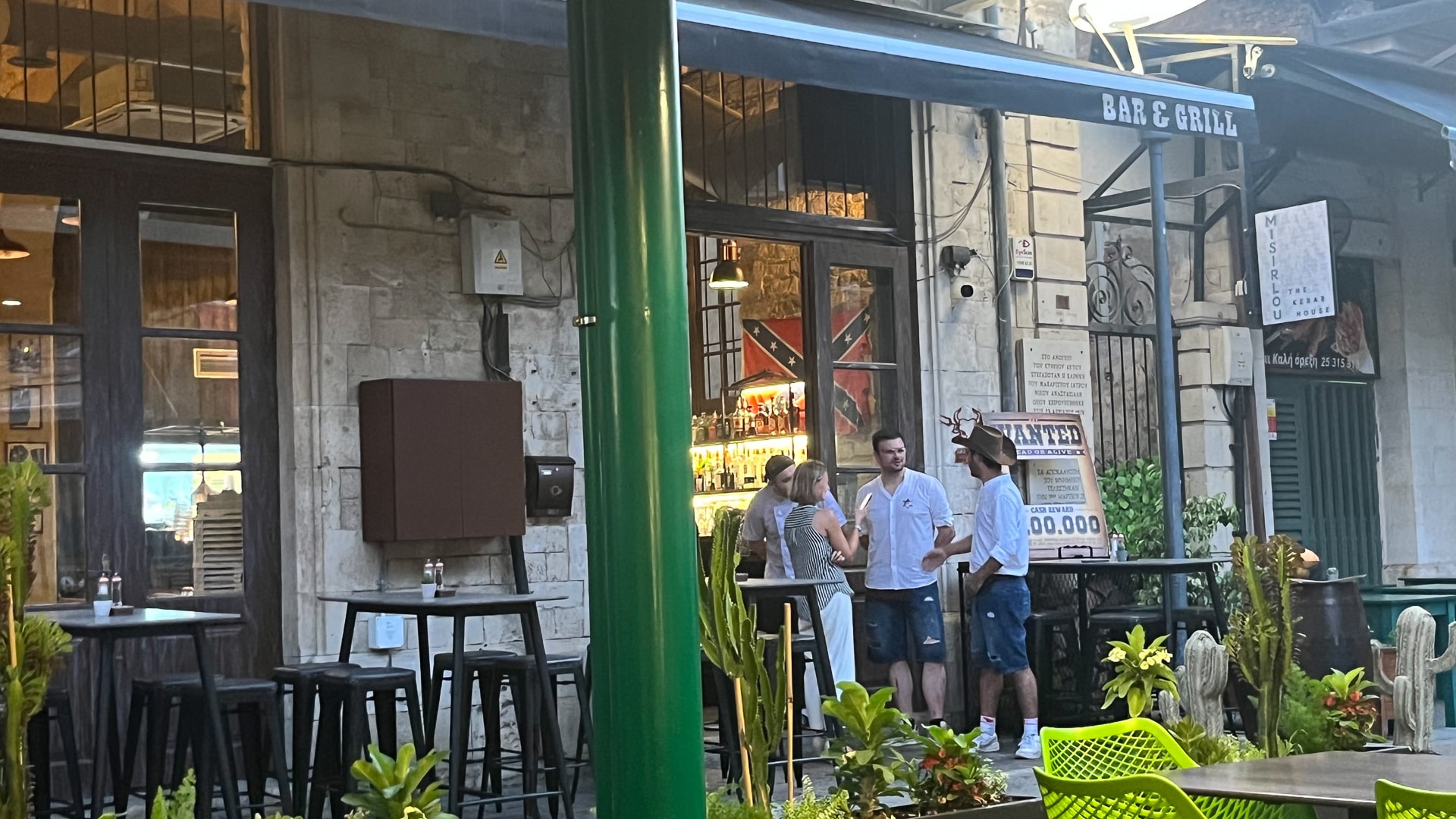
“If you sell an apartment in Russia, you get paid in cash, then exchange it for crypto at one of the thousands of crypto booths,” Misha began. Once converted into cryptocurrency, the money can easily be transferred across borders and exchanged into local currency. Most exchanges happen over Telegram, but after CEO Pavel Durov’s arrest in France and reports of increased regulation by European governments, it may no longer be secure for Misha.
Misha’s frustration with sanctions against Russia was also palpable, even though he’s profiting from them.
“I curse them,” he said. “They make life harder for ordinary, non-complicit people.”
Misha continued describing the difficult process of moving money from Russia to Cyprus.
“If you try to transfer money from selling an apartment in St. Petersburg, forget it,” he said. “European banks won’t touch it, even though it’s not directly tied to sanctions.”
He described how he had helped a Russian client purchase an apartment from a Cypriot developer for $500,000 on paper, with an additional $700,000 paid in crypto. In two years, the client could sell the property for its full value of $1.2 million, turning illicit funds into clean, legal capital.
In Cyprus, property investment remains a foolproof way to acquire if not passports then at least residency permits. A quick scan for apartments on the Russian e-commerce website Avito will yield results advertising properties as “ideal for residency permits.”
“In Russia, everyone earns money in ways that would be deemed illegitimate by Western standards [i.e., through corruption], but it’s not criminal activity—it’s just how things work there,” Misha added.
“Banks are like government agents now—they don’t want to risk sanctions violations, so they block anything remotely Russian instead of sorting through what’s legal,” he said.
Misha also pointed out what he deemed “hypocrisy” in the Western global financial system.
“Raiffeisenbank, UniCredit, Coca-Cola, Procter & Gamble—they’re all still in Russia,” he noted. “It’s all theater. The real victims are regular people, not arms dealers exploiting international loopholes.”
While European officials would consider schemes such as Misha’s illicit and their participants lawbreakers, he maintained that “innocent people” are driven to them by overreaching sanctions.
As an example, he spoke of two Russian friends—one an academic, the other a fashion entrepreneur—who own a travel agency catering to tourists visiting Russia. After the war started, their business relocated to Cyprus, and clients now make payments to its Cypriot accounts. However, they still need to pay Russian hotels, drivers and guides, which forces them to rely on services like Misha’s to circumvent sanctions and move money to Russia.
“This is the impact of sanctions, but tourism isn’t a restricted sector,” he explained. “There’s nothing illegal about it.”
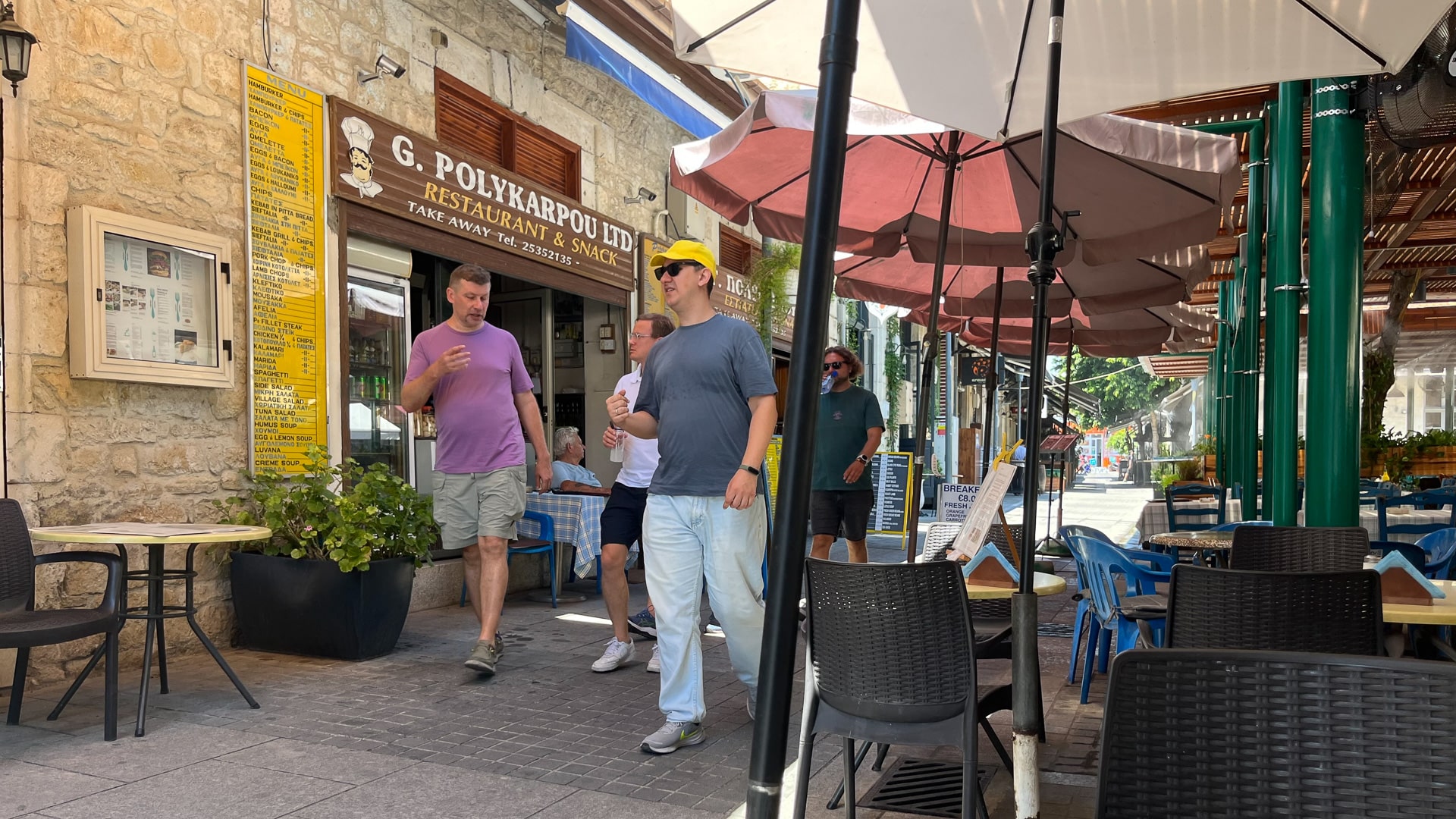
When I pressed him about the argument that such sanctions should work to politicize the Russian public, he responded that the “overwhelming majority” of his clients oppose the war and just want to live and retain their assets.
“It’s America dictating these sanctions to Europe,” Misha added, with “Rhinestone Cowboy” blaring from the restaurant’s speakers. “Ironically, I can open an American bank account with my Russian passport, but in Europe, it’s much harder.”
At one point, he mentioned that his favorite TV show was “Ozark,” the American crime drama centered around an ordinary family involved in a money-laundering operation for a Mexican drug cartel. In the show, the teenage daughter starts working at the family casino, helping her parents launder money.
Misha’s own stepdaughter recently found work at a Cyprus-based, Russian-language online casino, as it was apparently the only job she could find that would provide her with enough income to secure a residency permit in Cyprus.
New beginnings
The new Russian diaspora emerging in Cyprus against the backdrop of the invasion has formed its own ecosystem. While IT personnel predominate, there are also Russians from various professions who are recalibrating their skill sets to service their compatriots.
I met a former professor of political philosophy from the once-progressive Moscow School of Social and Economic Sciences who asked to be referred to as David.
In addition to occasional independent research, most of his revenue now comes from his newly established business as a “personal business consultant”—more simply put, a life coach for clients like Misha, whom he charges 3,000 euros a month for weekly lessons to “combat his procrastination.”
As the night descended over Limassol’s old town, we huddled at a table outside a closed coffee shop, engaging in a two-hour conversation about why Russia’s intellectual and business elites tolerated Putin’s authoritarianism for so long.
“The nature of the regime is a systemic strategy that draws its participants into its own rules,” David explained. “It increased the level of violence and threats while constantly disguising these threats and creating the illusion of an autonomous space.”
This illusion of autonomy, he noted, was crucial for maintaining control.
“They slowly restrict the level of freedom while elevating the level of threat, but there is a constant demonstration of the freedom that exists within these new perimeters,” he said.
He pointed to the regime’s tactic of occasionally releasing political prisoners as an example, “lowering the gradient of pressure.”
Such strategies, he argued, created a false sense of progress and led people to accept increasingly oppressive conditions. This psychological manipulation contributed to the regime’s resilience, as individuals grappled with the complex balance of fear and perceived freedom.
In addition to his consultancy, David, 49, and his brother, a former director of a major Russian bank, conduct business and negotiation simulations on the island that place participants in high-profile business and political dealings. The immersive exercises aim to replicate the complexities and high stakes of real-world negotiations. One such simulation had participants attempting to negotiate the end of the war against Ukraine, roleplaying as Russian and Ukrainian government officials sent to sue for peace.
The idea was inspired by David’s brother’s time at the Harvard Kennedy School, where a program called the Negotiating Task Force was created at the Davis Center for Russian and Eurasian Studies. The program is known for training people in effective negotiation strategies and tactics, drawing on real-world scenarios to prepare participants for high-stakes discussions.
In addition to workshops and networking meetups, the Russians have also introduced a cultural component to the island to fill the voids created by their emigration. One example is a monthly screening of newly produced, licensed Russian films, hosted by a 45-year-old AI entrepreneur who asked to be called Fyodor at an old theater in Limassol.
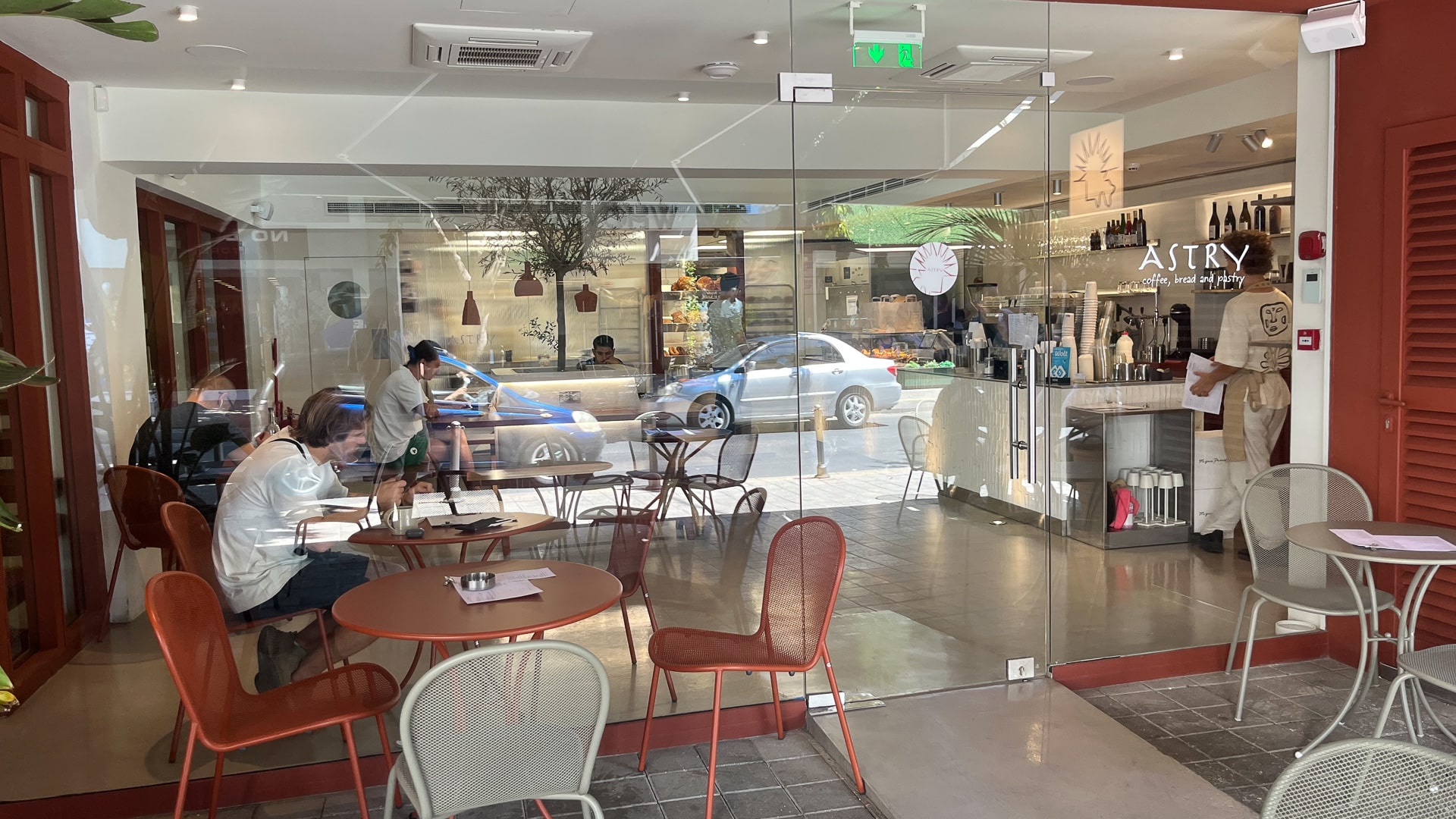
Fyodor, who was born in Soviet Leningrad, began his career as an engineer, launching successful telecommunications businesses before eventually entering the world of online streaming. As the former CEO of a major movie-streaming platform that was later acquired by government-affiliated corporations, he witnessed firsthand the government’s gradual restriction of freedom and its relentless monopolization of virtually all spheres of activity.
Despite claiming to be aware of Russia’s escalating authoritarianism, the former CEO expressed enthusiasm for the vibrant opportunities presented by the country’s economy.
“In one respect, our streaming services offered products that were even better than Netflix because we had to work twice as hard to attract an audience,” he said on the second floor of a sleek, Russian-owned coffee shop, noting the unique challenge of tailoring a platform to a generation that had grown up pirating DVDs and online films. A pair of glasses and a light beard framed his long, thin face.
However, as time went on, he witnessed a troubling shift as censorship increasingly permeated the industry.
“Every time we discussed new projects, we thought, ‘How will the state perceive this?’” he explained. “Some films with blacklisted actors we wouldn’t even stream.”
While he was initially willing to adapt to these changing circumstances, he said the escalation of war ultimately compelled him to leave everything behind. He resigned from a high-level position that provided him with a substantial income, driven by his opposition to the government and the ongoing conflict.
“I quickly assessed all the scenarios of what would happen to the media industry and realized that I did not want to stay,” he said.
However, relocating to Cyprus meant a complete career overhaul after his work in a hyper-localized industry. The transition led him to pivot toward an AI startup, acknowledging the need for reinvention and seizing the opportunity presented by an industry booming in global popularity.
“My income fell, well, five or seven times,” he said, reflecting on the stark financial reality of starting anew. “You just have to build everything from scratch; you need to look both forward and back, because it felt like this situation would last a long time.”
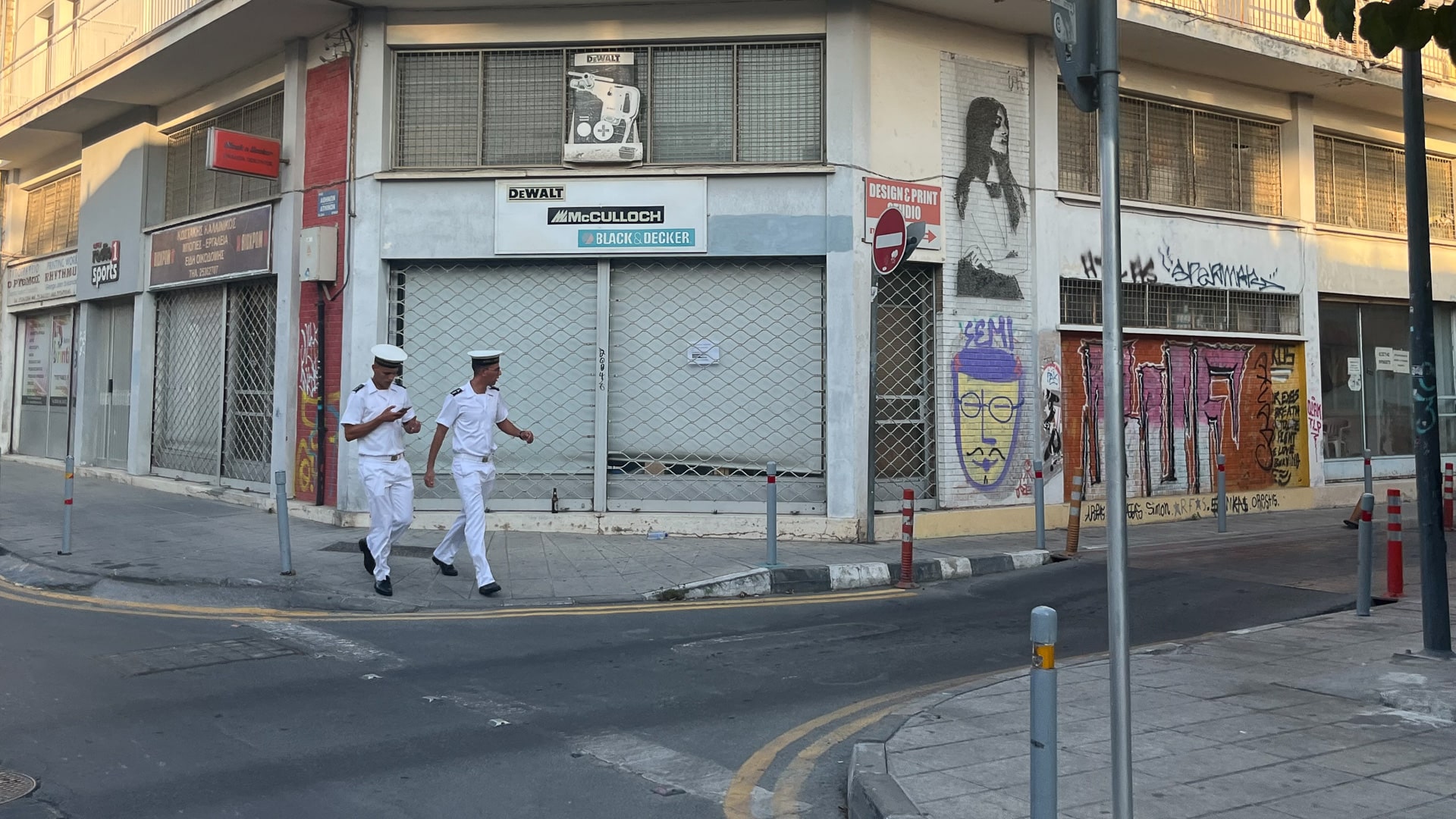
I had heard from various sources that much of the AI technology Russians are developing in Cyprus is aimed at nefarious purposes. Rather than driving innovation for broad societal benefit, some AI tools appear to serve questionable ends—such as generating automated responses for OnlyFans models to manage their thousands of viewers or, more disturbing, using AI to create nude images of people from online photographs.
When asked about the focus of his own AI startup, Fyodor was evasive, offering only generic and cryptic comments often heard from Silicon Valley entrepreneurs.
“AI will create a major gap between ordinary people and wealthy elites. You have to be part of this wave and surf it to survive the first act of these drastic changes,” he said with a casual chuckle.
Toward the end of our conversation, I inquired whether affluent Russians like him who oppose the war could leverage their resources to donate to humanitarian causes or support Russian political prisoners. Once again, he refused to elaborate, giving a convoluted response about the many Russians in Cyprus who still have family and other ties to their homeland.
Perceptions of the war in Ukraine
One notable feature of visiting Cyprus in 2024 is that GPS on all map applications—jammed due to the ongoing conflict between Israel, Lebanon and Hamas—will, 90 percent of the time, display your location as Beirut Airport. Another sight are the groups of young, stocky American naval personnel spilling out of the old town bars at exactly 10 p.m., hastily stumbling to get back to their ships before curfew.
The war in the Middle East is ever-present in Cyprus, in the form of American naval cruisers stationed at a British base, the presence of Israeli and Lebanese migrants and probing questions from Cypriot taxi drivers about passengers’ opinions about the conflict. By contrast, the war in Ukraine feels distant even for many within the Russian community here.
But not for all.
In February 2024, the Russian government arrested Pavel Muntyan, a 46-year-old entrepreneur and animator, in absentia for “discrediting the Russian armed forces.”
Unlike Russian businesspeople like Fyodor, who hastily fled to Cyprus after the invasion of Ukraine and remain cautious about speaking publicly, Muntyan had been on the island for a decade and was a vocal critic of the Kremlin long before the full-scale war began. His outspoken opposition to the regime only intensified after the invasion, making him one of the few Russian Cypriots who openly opposed the war.
Beyond his public criticism, Muntyan took concrete action. He launched a fund to support Ukraine on his Telegram channel, raising hundreds of thousands of dollars for protective gear, food and even courses on how to sew bulletproof vests.
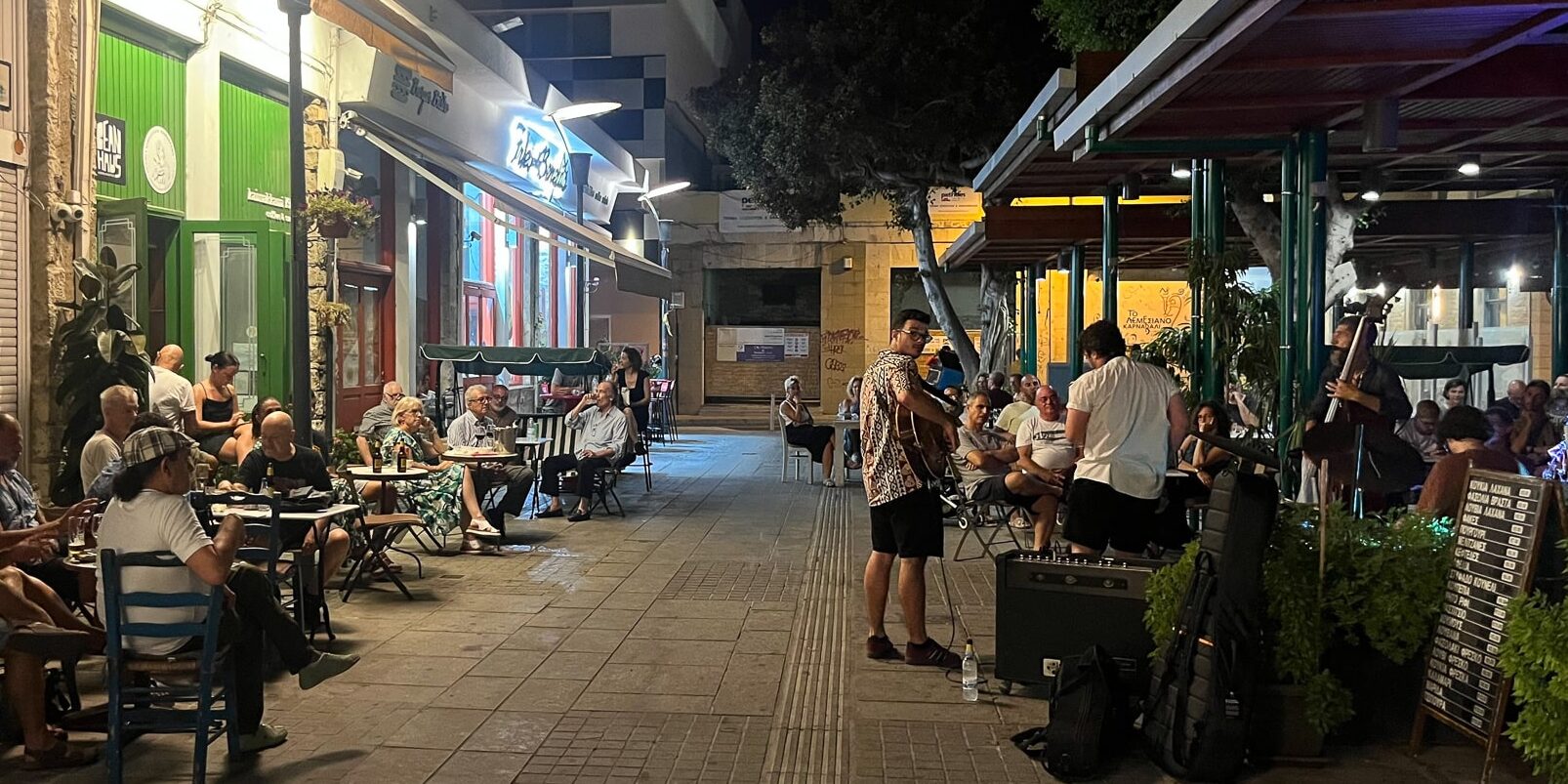
His career began as a speechwriter for the Moscow mayoral administration of the once-powerful Yury Luzhkov. From there, he transitioned into web design and eventually found his calling in animation. His most famous creation, a YouTube series called “Mr. Freeman,” became a cult phenomenon in the late 2000s. The minimalist, surreal animated figure delivered sharp monologues that critiqued societal complacency, consumer culture and the power structures that shaped modern life.
“Mr. Freeman” grew in popularity, crossing borders with translations into multiple languages, and Muntyan continued pushing boundaries. However, Russia’s more recently fraught political climate forced him to relocate his animation studio to Cyprus shortly after the annexation of Crimea.
“‘Mr. Freeman’ was already crossing the red lines laid out by the ruling [United Russia] party,” Muntyan told me over Zoom from his home in the southwestern city Paphos, his confident-looking face sporting a blonde beard. Even back then, he said, he was certain a full-scale war with Ukraine was inevitable.
Life in Cyprus hasn’t been without its challenges. Muntyan described the complications of dealing with sanctions, particularly when it comes to managing residency permits and banking.
“Things have become harder,” he said, explaining how Russian passports draw scrutiny from banks, prompting his company accounts being blocked without warning.
His defiance is evident in his recent work, including a music video he created for the Russian rapper Ligalize, “Peace to Your Home.” The video, which uses AI to paint a grim and psychedelic portrait of Russian territorial conquest and domestic repression, was another catalyst for his arrest in absentia by the Russian authorities.
While few Russians in Cyprus are willing to risk as much as Muntyan, the Russophone tech and business sector on the island seems to be less divided between Russian and Ukrainian communities than in other diaspora hubs like Germany and Georgia.
At the CypRus IT meetup, I met a Ukrainian woman who had no reservations about associating with Russians. She had come to Cyprus with her husband, a Belarusian angel investor who recently became a billionaire thanks to his menstrual-cycle tracking app, Flo.
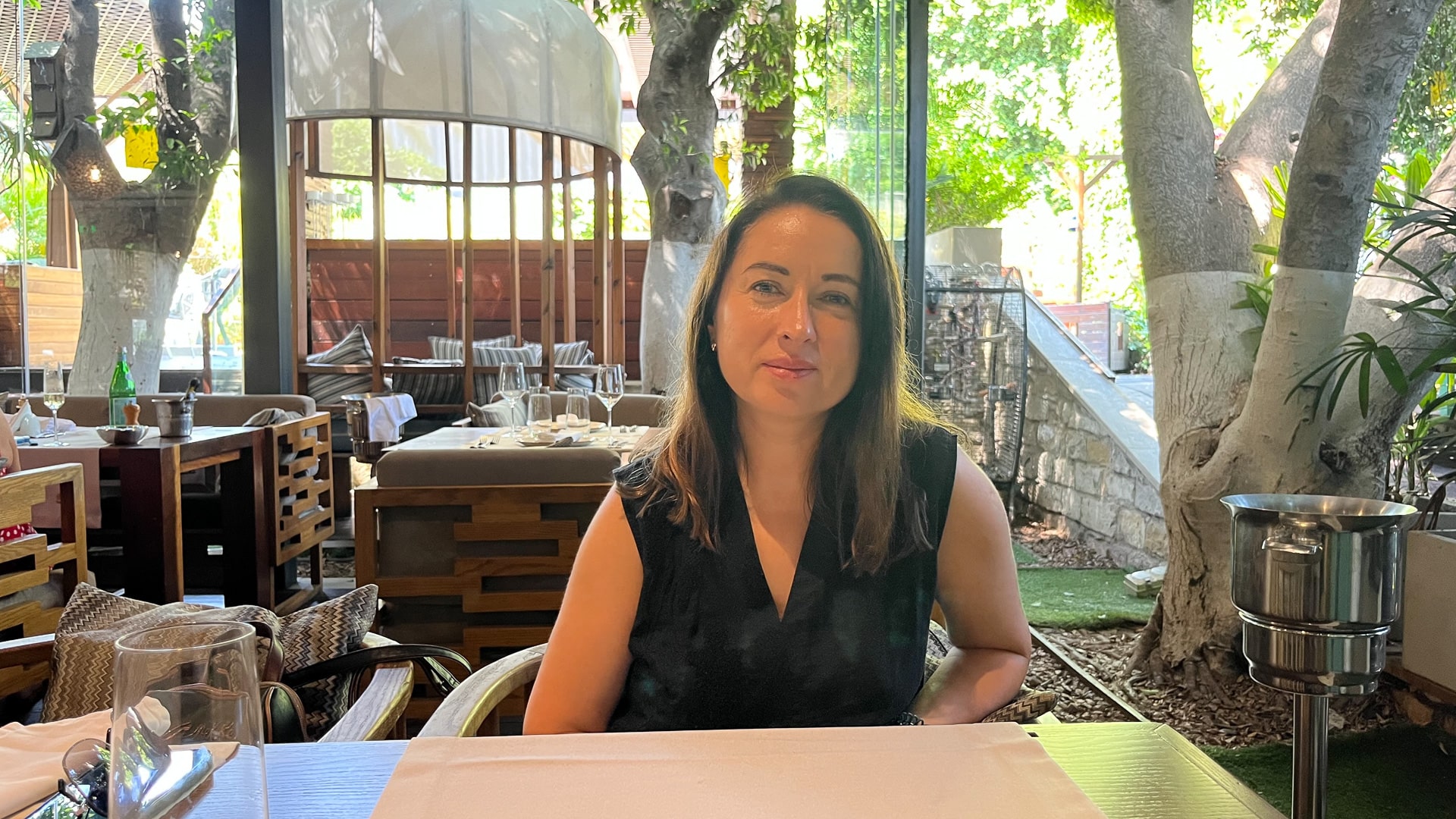
Over breakfast at a restaurant popular with Russophone clientele—many dressed in suits, with women sporting exaggerated lip enhancements—we discussed the impact of the war in Ukraine. Oksana, 44, was born in Crimea and later moved to Odesa. She eventually found herself in Moscow, working in pixel and game development. After relocating to Minsk, she met her husband and they settled in Cyprus in 2020, never to return.
Oksana spoke at length about how she had helped her family evacuate from the shelled areas of the Vinnytsia region. While she understands the resentment that Ukrainians, including her relatives, feel toward Russians—admitting it may take “generations” for relations to heal—she said she has tried to suppress her own anger through therapeutic means.
“I made a decision to stop hate from multiplying within me,” she said, biting into her eggs Benedict as her frazzled brown hair hung over the shoulder straps of her black dress.
Instead, Oksana said, she focuses her energy on helping alleviate the crisis. She mentioned that she and her husband finance a volunteer fund in Ukraine that purchases ambulances and helps evacuate Ukrainians from shelled zones. Regarding the Russian community in Cyprus, she expressed hope that those attending the networking meet-ups quietly oppose the war and are simply unable to speak out publicly.
A Russian national I spoke to at the meet-up—among the few using AI in his work for benevolent purposes like preserving indigenous languages—declined to speak on the record, mentioning that some former classmates hold high-ranking positions in the Russian Federal Security Service.
In addition to assisting her husband with the psychological aspects of his angel investment work, Oksana recently completed a remote Master’s thesis for a Moscow university. Her research involved comprehensive sociological surveys of how Russians, Ukrainians and Belarusians raised in post-socialist societies relate to wealth.
Her almost comically on-the-nose project, considering the context of the Russophone Cypriot community, yielded straightforward results: the more wealth accrued, the more people feel insecure. They often struggle with identity crises after rapidly joining a newly formed wealthy elite. When comparing themselves to others in similar financial brackets, they have a different threshold for what constitutes wealth and don’t see themselves as part of that category.
The study focused on the post-Soviet population aged 30 to 50, which happens to be the most common age range for Russians in Cyprus.
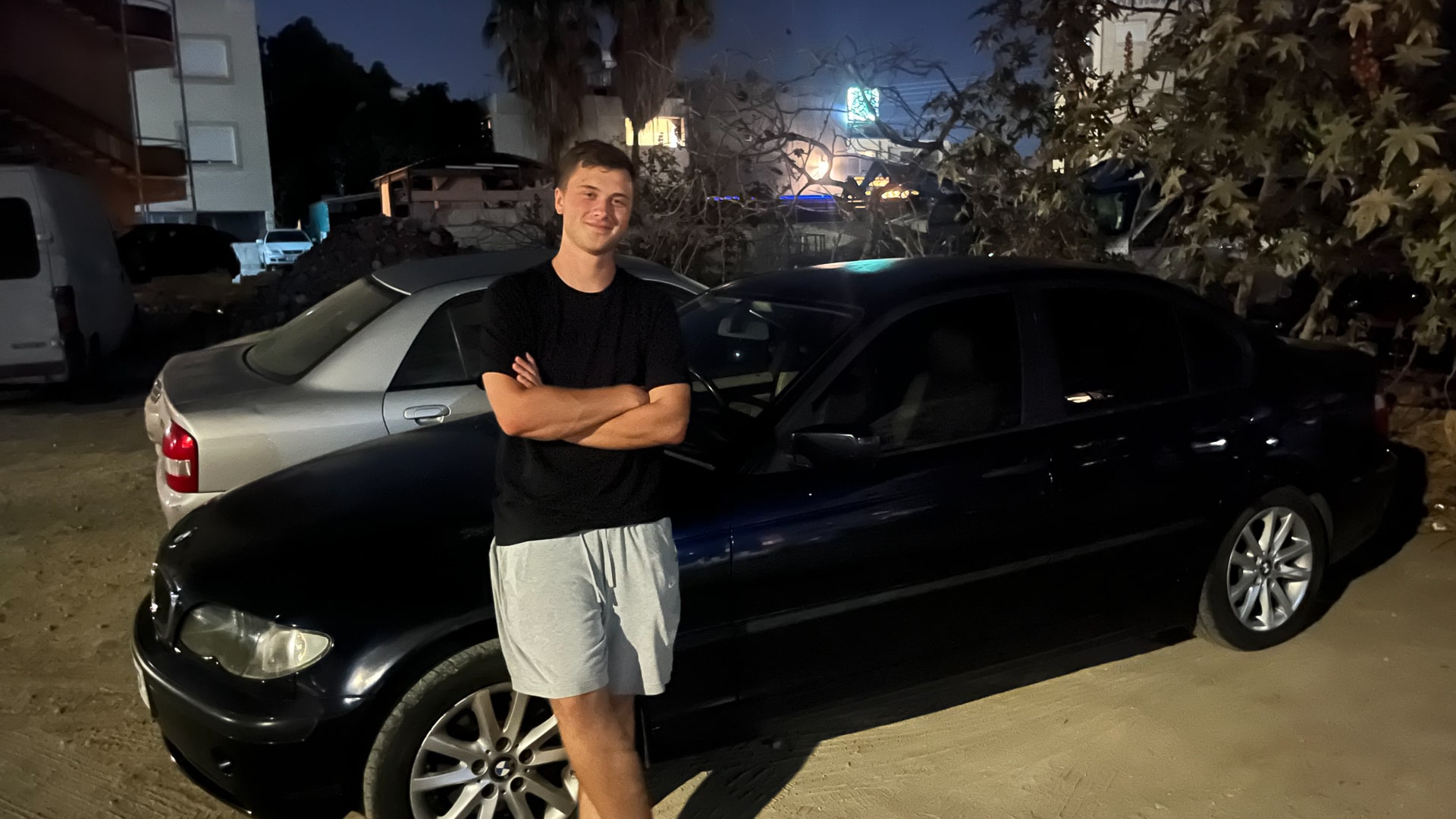
A young Russian hustler
While countries in Russia’s so-called near-abroad like Georgia, Germany, Armenia and Kazakhstan have primarily attracted Russian migrants in their 20s and early 30s, Cyprus, with its higher cost of living, continues to draw older Russians, many arriving as couples with children.
At age 19, Grisha, a student and part-time assistant to Misha, the cryptocurrency money-mover, was the youngest emigre I met. Born in St. Petersburg to an “ordinary middle-class” family when Putin was well into his first term two, he recounted how a teacher at an after-school English-language theater program financed by American grants inspired him to think critically about the policies of his government.
On the first morning after Russia invaded Ukraine, Grisha (a nickname for Grigory) arrived at school in shock that his classmates—likely parroting comments made by their parents—were gleefully cheering the invasion. Soon, Grisha felt even more stifled by his surroundings as students were mandated to perform patriotic gestures, such as arriving 30 minutes before the start of school to sing the national anthem.
He began to consider leaving the country because he “felt disgusted by the situation.” By early summer 2022, his parents agreed to use the last of their savings to help him leave. To be accepted by a university abroad, he needed to complete the International English Language Testing System (IELTS) exam. However, the test was no longer offered in Russia because of the war, so he flew to Uzbekistan.
Before his departure, he worked a summer construction job in St. Petersburg to save money. In August 2023, he moved to the Greek side of Cyprus, where his best friend was living with his father. He took on a series of menial jobs—beach attendant, waiter—before starting a semester at a university in Turkish Northern Cyprus, the de facto state recognized only by Turkey.
He quickly realized the university wasn’t the right fit, feeling the education was subpar and the atmosphere unwelcoming. He lived in a cramped apartment where “the walls were peeling and the pipes were rusty,” and would travel two hours every week to work as an entertainer at Russian children’s birthday parties to earn extra money.
His real goal was to study in the United States. On several occasions, he traveled to Turkey to take the SAT, staying at shelters rung by the assistance group Kovcheg funded by the opposition political figure Mikhail Khodorkovsky. In early 2024, he made his way to southern Cyprus, flying via Armenia because crossing the border by land was prohibited.
Recently, he was accepted into an accelerated program organized by JetBrains, a formerly Russian, now Czech software company. The highly competitive program targets Russian students excelling in mathematic to shape the next generation of entrepreneurs. Grisha hopes it will enable him to transfer to MIT.
“I want to move to the US and get a passport,” he told me, explaining that his early exposure to Americans in after-school theater programs had stuck with him.
After our chat, Grisha hopped into an old BMW lent to him by an associate, on his way to teach a tennis lesson to older Georgian emigres. For additional income, he waits tables, works for a corporate events company as a caterer, and delivers cash to clients for Misha, the cryptocurrency entrepreneur who sees “potential.”
If everything goes according to plan, Grisha will find his way to MIT. If it doesn’t, it seems he can find a place within the ranks of Cyprus’s gray Russian economy.
Top photo: A restaurant advertisement in Russian Cyrillic at Limassol’s beach

